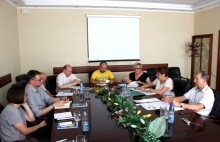Ukraine: the struggle for social dialogue in health reforms

They agreed to search for new effective ways to reform the health system in the working people’s interests, and to examine the role of trade unions in this process.
"We are deeply convinced that the healthcare reform in Ukraine has adverse impact on both the patients, and the healthcare workers" said Tristan Masat. "So we would like to hear about the role of trade unions in this process. More specifically about the history of relationship between trade unions and the Ministry of Health, your comments and suggestions relating to the healthcare reform and the healthcare system as a whole."
Grygorii Osovyi spoke of FPU’s actions to ensure protection of constitutional, social and economic rights and interests of the working people.
"Of course, we are interested and concerned about two important questions relating to the healthcare reform," he said. "This is, firstly, how the patients’ rights will be protected and, secondly, how the healthcare workers’ rights and interests will be protected. We have not yet received clear and understandable answers to these questions from the Ministry of Health."
FPU and HWUU experts had already sent their comments and proposals on the healthcare reform to the Ministry of Health and to parliamentary factions.
"Our position is that the healthcare reform should be efficient, transparent, and have social content," said Viktoriia Koval, HWUU President.
"But getting the Ministry to be engaged in dialogue has been very difficult. Its officials do not want to listen to trade union initiatives and proposals. Despite the requirements of the law on social dialogue, documents relating to the healthcare reform were not agreed with trade unions," she added.
She further decried the unilateralist manner of foisting ill-thought out reform on the sector, saying that:
“our union and the FPU are trying to restore social dialogue in the sector, but that has been almost impossible. Neither trade unions nor employers were involved in the development of the reform we are now expected to implement with likely dire costs to healthcare delivery. The union which represents the interests of more than 700,000 healthcare workers has the right and obligation to participate in the healthcare reform policy-formulation process."
The FPU meeting with Solidarity Center was preceded by other meetings in recent months to seek international support for the trade unions in their relations with the Ukrainian government.
HWUU, together with other PSI/EPSU health affiliates in Georgia and Moldova, organised an international workshop on healthcare reforms in Kiev, with the support of ILO, ITUC, PERC and EPSU, on May 15 and 16. At the workshop, Mathias Maucher, the EPSU Health and Social Services Policy Officer, shared information on relevant EU norms and regulations in the context of the Association Agreement Ukraine-European Union - e.g. in the fields of labour law, occupational health and safety or public health - signed in 2014.
PSI and EPSU highlighted that the health system in Ukraine should be built upon the public services principles of universality, accessibility, affordability, continuity, user rights, transparency and accountability. Health services have to be organised to operate in the general interest of all citizens and patients. This requires funding based on principles of solidarity in the context of tax systems and/or by social contributions paid in equal shares by employers and employees, and not pro-market reforms of the sector.
In a statement issued at the end of the workshop, participants drew the attention of the Ukrainian government to the recognition of each person’s life and health as being of “the highest value” for State policy and the ongoing healthcare reform which “is carried out within the framework of liberalisation policy aimed increasing private capital income.”
The statement ended with a demand for all provisions of the healthcare reform to be harmonised with the social partners in accordance with the EU-Ukraine Association Agreement, and a call to public organisations of healthcare professional community and civil society organisations to struggle together against the antisocial healthcare reform, by coordinating joint actions in defence of healthcare in Ukraine.
Rosa Pavanelli, PSI General Secretary and Jan Willem Goudriaan, EPSU General Secretary wrote to both Mr Volodymyr Groisman, the Ukrainian Prime Minister and Ms Ulana Suprun, the acting Minister of Health, urging the Ukrainian state to have a rethink on the reforms and ensure that workers and citizens be put at the heart of the process.
Further, in a resolution dated 22 June, the FPU presidence explicitly rejected the reforms and called for a system of compulsory state social health insurance by adopting a legislative act. This shows the readiness of workers in Ukraine to fight in defence of the right to health and health workers’ trade union rights . This struggle, as PSI, EPSU and the Solidarity Center have emphasized, requires international support.

